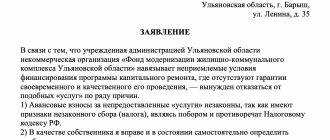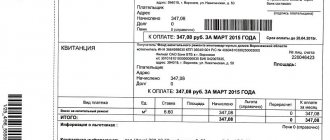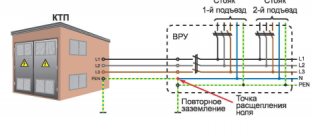Is it legal to charge contributions and does this need to be done for all residents of an apartment building?
Until 2012, contributions for major repairs were considered voluntary . Since the publication of Federal Law No. 271 of December 25, 2012, the Housing Code has clearly indicated the requirement for making mandatory payments. According to clause 6.1. Art. 2 of the Housing Code of the Russian Federation, public authorities are obliged to promptly provide services for major repairs of the building at the expense of contributions from the owners of the premises.
The owners, in turn, undertake to transfer monthly contributions to a fund organized for the purpose of collecting funds for major repairs (clause 1 of Article 169 of the Housing Code of the Russian Federation). The following categories of persons have the exclusive right to non-payment of contributions and in the following cases (clause 2 of Article 169):
- living in houses recognized as unsafe;
- living in houses subject to demolition;
- persons living on the territory of a land plot seized in favor of the state or municipality;
- by decision of the general meeting of owners upon reaching the minimum amount of capital in the fund (clause 8 of article 170 of the Housing Code of the Russian Federation);
- when carrying out major repairs, where repeated provision of relevant services is not required (clause 5 of Article 181 of the Housing Code of the Russian Federation).
Certain categories of citizens also have the right to partial or full compensation of expenses for major repair obligations in accordance with clause 2.1 of Art. 169 Housing Code of the Russian Federation:
- unemployed citizens living alone who have reached the age of 70;
- non-working pensioners living together;
- non-working disabled people of groups I and II.
You will learn more about who is exempt from paying for major repairs and what benefits exist in a separate article.
The obligation occurs after no more than 8 months from the date of inclusion of the house in the capital repair program (clause 3 of Article 169). Work can be carried out at the expense of the funds of a housing cooperative or association transferred for the appropriate purpose (clause 4 of Article 169).
What happens if you don’t pay into the capital repair fund?
For improper fulfillment of obligations to make contributions for the maintenance of residential premises, the following types of liability are provided:
- Court order (Chapter 11 of the Code of Civil Procedure of the Russian Federation). The debtor is sent an order demanding reimbursement of the amount of debt at the corresponding request of the collector.
- Court decision (Chapter 16 of the Code of Civil Procedure of the Russian Federation). The debt is collected by a court decision at the stage of completion of the claim proceedings in the event of an appeal against the court order.
- Accrual of penalties for major repairs (clause 14.1 of Article 155 of the RF Housing Code). If there are no payments within the period established by law, the amount of debt increases by a certain percentage for each day of delay.
- Fine . An additional measure of liability within the framework of a court decision in conjunction with the recovery of the principal amount of debt in case of malicious evasion of obligations.
- Seizure of property (subclause 7, clause 1, article 64 of Federal Law No. 229). During enforcement proceedings with the participation of bailiffs, property valued at the total amount of the debt is confiscated from the debtor. Subsequently, the property is sold at open auction, and the proceeds are sent to the claimant to pay off losses.
- Seizure of property (subclause 7, clause 1, article 64 of Federal Law No. 229). Another penalty in enforcement proceedings involving bailiffs. The property is seized for the benefit of the capital repair fund until the debt is paid.
- Seizure of accounts (subclause 7, clause 1, article 64 of Federal Law No. 229). A measure of collection in enforcement proceedings with the involvement of bailiffs, expressed in the freezing of the debtor's active bank accounts or withholding funds in favor of repaying the debt.
- Restriction on travel (subclause 3, clause 1, article 64 of Federal Law No. 229). Bailiffs have the right to issue a ruling on a temporary restriction on crossing the border of the Russian Federation if the amount of debt exceeds 30 thousand rubles.
Enforcement proceedings with the participation of bailiffs are initiated at the request of the management company or upon the fact of a court decision at the request of the claimant (clause 1, clause 5 of Article 30 of Federal Law No. 229).
As an enforcement measure, the debtor does not have the right to evict from the residential premises . The presence of debt for major repairs acts as an unofficial encumbrance in the case of the sale of an apartment, since the transaction is accompanied by the provision of a certificate from the BTI. This circumstance will adversely affect the cost of housing and buyer confidence.
You will find all the details of whether it is possible not to pay contributions for major repairs in an apartment building in another material.
The portal's lawyers provide informed advice
Contributions, established at the regional level, for major repairs are a mandatory payment, which is paid in the same way as services for water and electricity. Thus, if the owner refuses to transfer funds, then in subsequent receipts he will find penalties that are justified in the Housing Legislation, namely in Article No. 155 of Part 14.1
In order to collect the debt incurred as a result of non-payment of contributions for major repairs, the regional operator has the right to file a claim against such owner. Of course, the claim will not be filed immediately, as a rule, for 1-2 months of delay or due to an underpayment of 50 rubles, they will not be filed in court. But, nevertheless, I will be notified, and penalties will also be charged. But if the debt exceeds six months, then you need to prepare for court.
On top of everything else, it must be added that those who do not pay for utilities also face legal proceedings. At the moment, the statistics are such that almost a million people do not pay utility bills or capital contributions, and yet live in peace. Nevertheless, measures are taken against persistent defaulters, but, so to speak, there are no mass litigations yet.
Summarizing the article, it is necessary to summarize and answer the question - to pay or not? The answer is clear - pay. After all, the bank does not ask the person whether he wants to pay off the loan or not, and so it is in this case.
Of course, you can deliberately refuse to pay contributions. However, the law provides not only for fines, but also for restrictions on moving abroad and an inventory of property with subsequent putting it up for auction. Let us note that first notifications will be received, then preliminary notification of the planned legal proceedings, and then the court, and in this case you will have to pay more than the debt.
about the author
Valery Isaev
Valery Isaev graduated from the Moscow State Law Institute. Over the years of work in the legal profession, he has conducted many successful civil and criminal cases in courts of various jurisdictions. Extensive experience in legal assistance to citizens in various fields.
How are debts calculated and late payments calculated?
Debts are collected by court order or decision. As a preliminary measure, at the pre-trial stage, penalties are added to the amount of debt.
Liability for non-payment before trial
According to clause 14.1. Art. 155 of the Housing Code of the Russian Federation, in case of failure to fulfill obligations to pay contributions, penalties are initially charged . The accrual is made after 31 days following the due date for payment of the contribution established in the region. Penalties are collected both in case of complete evasion of payments and partial evasion.
The formula involved in the calculations is VP = TD x (KS/300) x DP , where:
- VP - the amount of the penalty taking into account the number of days of delay;
- TD - the body of the debt or the amount of the principal debt;
- KS - key rate established by the Bank of the Russian Federation;
- DP - number of days of delay.
A penalty is charged for each day of delay in the amount of one three hundredth of the Bank's rate. According to Government Decree No. 1340 of December 8, 2015, from January 1, 2021, the key rate is used for calculations instead of the refinanced one.
Penalties are included in the body of the contribution and are reflected in the column of the receipt for major repairs . Payment is made monthly. If payments have not been made in full, then the entire amount of payment is recognized as the body of the debt; if partially, part of the unpaid amount is recognized. The amount of the principal debt involved in the calculations increases daily in proportion to the duration of the delay.
Example. On February 1, 2021, the owner of an apartment with an area of 30 sq.m., living in a region with an established rate of 15 rubles/sq.m., did not pay a fee of 450 rubles. From March 2, the accrual of penalties begins according to the following calculations: 450 x (7.25/300) x 1 = 10.875 - the amount of the penalty for 1 day of delay. Starting from March 3, the body of the debt will be increased by this amount, and 2 days will be accepted as the number of days of delay.
Can the fund sue non-payers?
In case of improper fulfillment of obligations to pay contributions for major repairs, including repayment of penalties, the management company has the right to go to court with a demand to collect the amount of debt from the owner of the residential premises. This requirement is implemented on the basis of a court order or court decision if the applicant provides evidence of unlawful evasion of obligations.
If you refuse to make contributions, what are the consequences?
The party that has formed and maintains the capital repair fund has the right to send to the court a demand for the issuance of a court order to collect the debt (Article 122 of the Code of Civil Procedure of the Russian Federation). The application is considered in the magistrate's court if the amount of the debt does not exceed 50 thousand rubles (subclause 1, clause 1, article 23 of the Code of Civil Procedure of the Russian Federation), otherwise in the district court. The applicant submits a written application in accordance with Art. 123-124 Code of Civil Procedure of the Russian Federation with the condition of providing documents confirming the debt.
In the absence of grounds for refusal listed in Art. 125 of the Code of Civil Procedure of the Russian Federation, a court order is issued within 5 days from the date of application and contains (Article 127 of the Code of Civil Procedure of the Russian Federation):
- number and date of issue;
- name of the judicial authority;
- information about the judge;
- details of the claimant: place of registration, name of the legal entity;
- known information about the debtor: place of residence, name, place of work, place and date of birth;
- a law allowing the execution of the claimant's demands;
- amount to be recovered;
- the amount of the fine or penalty;
- the amount of state duty, which is compensated by the debtor;
- details of the applicant's bank account for transferring funds;
- debt formation period.
We do not recommend completing the documents yourself. Save time - contact our lawyers by phone:
8 (800) 350-14-90
The order is issued on a special form in 2 copies signed by the judge. A copy is sent to the debtor's address. The decision is made without the participation of the owner and can be challenged within 10 days from the date of notification of delivery or from the date of expiration of the storage period for postal correspondence (Article 128 of the Code of Civil Procedure of the Russian Federation).
If no objections are received, the claimant is given a second copy of the order with an official seal, which acts as a writ of execution. At his request, the document is sent to the bailiff.
In a separate publication, we will tell you whether you can refuse to make contributions and how to do this legally.
Is it legal or not to appeal a collection order?
According to Art. 129 of the Code of Civil Procedure of the Russian Federation, in order to cancel an order at the stage of enforcement proceedings, the debtor must apply to the magistrate’s court, which made the decision, within 10 days from the date of receipt. It is necessary to submit a written application requesting cancellation and indicating objections: Disagreement with the amount of the debt, complete disagreement with the debt, etc.
Upon review, the judge issues a ruling to cancel the order . At the same time, the creditor retains the right to present claims in the manner of claim proceedings, where the debt, in the event of a positive decision of the court, is collected on the basis of a court decision. Copies of the document are sent to the parties no later than 3 days from the date of issue.
You can challenge a court order after 10 days if the debtor proves that he could not go to court for good reasons or due to inadequate notification due to circumstances beyond his control. In this case, it is necessary to file a petition to restore the deadline.
Period after which the management company can sue
The procedure for using the premises (residential or non-residential) obliges the owner (tenant) to fully compensate the cost of utilities.
The payment period is set monthly and, according to the general rule, a week to a week and a half before the agreed term, each property owner must receive a receipt indicating the amount of housing and communal services, as well as additional amounts to be repaid. Every month, service providers must conduct reconciliations to identify citizens who are evading their financial obligations. If unpaid invoices are identified, notifications must be sent regarding the need to pay payments.
The legislator does not limit the period during which public utilities can file a claim in court.
Since 2021, a simplified procedure for collecting funds from debtors has been provided. The application is considered in court in a magistrate's court after the subscriber has accumulated a debt for the previous three months and the amount of the debt does not exceed 0.5 million rubles.
Judicial practice: can a debt be collected after the expiration of the term?
Based on the experience of judicial practice, when confirming evasion of payments on the part of the defendant, the courts satisfy the demands of the plaintiff. Missing the limitation period is often not a basis for refusing the plaintiff’s claims, but is partially satisfied.
For the benefit of the fund
In accordance with the decision of the Yeletsk City Court of the Lipetsk Region dated January 29, 2019 in case No. 2-2077/2018, the plaintiff filed a claim with the court to collect debt for major repairs of non-residential premises in the period from September 2014 to May 2021.
The representative of the defendant appealed to the transfer of the premises into the ownership of the debtor at the time of merger and the absence of a legal provision allowing the transfer of the debt to one personal account, as well as to the omission of the statute of limitations.
The court ruled that the defendant is the owner of the premises in the apartment building, which entails the obligation to pay fees for major repairs in accordance with Art. 153, 154, 158 and 169 LC RF. The court found the arguments about the impossibility of merging accounts untenable, since the premises had undergone redevelopment with the assignment of a single address. The defendant also did not deny that the debt of the previous owner was transferred to the new owner.
In terms of missing the statute of limitations, the court decided to reduce the amount of debt in accordance with the term of the billing period, partially satisfy the plaintiff’s demands and collect the debt in the period from August 2015 to May 2021. Additionally, the defendant was charged the amount of state duty paid by the plaintiff.
Also on the pages of our portal you can read the following articles:
- Tariffs for the maintenance of common property in an apartment building.
- Who is exempt from paying for major repairs in high-rise buildings?
Can the deadline be interrupted or suspended?
The limitation period may be suspended or interrupted. In this case, it will not occur on the date on which you expect it to occur.
Subscribe to our newsletter
Most often this happens due to the debtor’s recognition of the debt. For example, in response to a complaint from the HOA or management company, the tenant responded that the debt really exists, but cannot be paid for some reason. In this case, the three-year period will begin to be calculated anew from the date of its recognition. However, this only works for those debts that have been recognized. The debtor can recognize them only for certain months.
Another example is when a debtor has paid debts for a certain period, but not in full. It turns out that you have committed actions that indicate recognition of the debt. In this case, the limitation period will also begin to run again.
Suspension of a period is a period when a period does not run due to the occurrence of circumstances provided for by law.
There are three groups of such circumstances:
- Preventing filing a claim. For example, the courts were closed due to coronavirus, and the plaintiff could not file a claim. In this case, the running of the period will be suspended for the period during which the claim could not be filed.
- Claims, i.e. when you dealt with the HOA or management company in a claim procedure. For example, they tried to resolve a dispute with the management company or HOA through the mediation procedure. The deadline is suspended for the duration of the procedure.
- Going to court. From the moment the claim is filed until the final decision on the case is made, the period is suspended.









